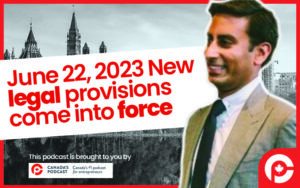New wage-fixing and no-poaching enforcement guidelines have been released by the Competition Bureau. Employers could be exposed to serious penalties following recent changes to the law.

To learn more about these new provisions, we sat down with Majid Charania, Director of Compliance at the Competition Bureau of Canada, to discuss all aspects of the new wage-fixing and no-poaching offences. You can find that video here!
The Competition Bureau is an independent law enforcement agency that protects and promotes competition for the benefit of Canadian consumers and businesses. Competition drives lower prices and innovation while fueling economic growth.The Competition Bureau works to support and protect Canadians by fostering a competitive and innovative marketplace.
The Bureau does this using various methods, including advocacy, outreach, consultations, partnerships, and enforcement.The wage-fixing and no-poaching amendments that have come into force are “an important step in the ongoing modernization of Canada’s competition law.
With these enforcement guidelines, we’re providing businesses with the certainty and predictability they need to ensure that they’re in full compliance with the law,” said Matthew Boswell, Commissioner of Competition.
The changes to the law came into effect June 23.
It is now a criminal offence for employers to agree:
● to fix, maintain, decrease or control wages or other terms of employment; or
● to refrain from hiring or trying to hire each other’s employees.
All fines for offences under the conspiracy provision—including agreements to fix prices, allocate markets, restrict supply, fix wages or refrain from hiring will be determined at the court’s discretion. This means that there is no maximum limit on fines for these types of offences. In addition a person found guilty of an offence under these provisions may be imprisoned for up to 14 years.
“The idea behind it is that it’s aimed at protecting competition in the labour market,” said Majid Charania, Director of Compliance for the Competition Bureau.
“There’s been some changes to the competition law in Canada that go back all the way to 2009. In 2009, the Competition Act as it’s known was amended to apply only to ‘sellers’. If you think of employment, employers are actually purchasers of labour. So the criminal provisions of the law didn’t adequately address harmful agreements amongst employers related to labour.”
“The conspiracy provisions of the Act, they don’t protect workers from agreements from employers that fix wages and restrict job mobility. So Canada arguably became out of step internationally. And international jurisdictions have recently identified no poaching and wage fixing agreements as particularly egregious.”
For example, in October 2021, the European Commission committed to expanding its conspiracy related enforcement to labour markets and that included those types of agreements.
In the last few years, the Department of Justice in the United States also looked to the courts for criminal sanctions for these types of offences in the labour market.
“The changes in the law, they’re really designed to protect labour market competition. If wages remain competitive and employees are able to move around without being hindered by anti-competitive barriers put up by employers, then that helps to ensure that labour competition is strong,” explained Charania.
So now that the Bureau is going to be empowered to investigate and take action against illegal agreements amongst employers, we really want to hear from anyone who thinks there might be these types of illegal wage fixing or no hire,no poaching agreements in their region or in their industry.”Any one who wants to find out more, file a complaint or share information should reach out to the Bureau’s information centre.
Take a listen to the interview or go to their page to learn more about wage-fixing and no-poaching enforcement guidelines.

Mario Toneguzzi
Mario Toneguzzi is Managing Editor of Canada’s Podcast. He has more than 40 years of experience as a daily newspaper writer, columnist, and editor. He was named in 2021 as one of the Top 10 Business Journalists in the World by PR News – the only Canadian to make the list)
About Us
Canada’s Podcast is the number one podcast in Canada for entrepreneurs and business owners. Established in 2016, the podcast network has interviewed over 600 Canadian entrepreneurs from coast-to-coast.
With hosts in each province, entrepreneurs have a local and national format to tell their stories, talk about their journey and provide inspiration for anyone starting their entrepreneurial journey and well- established founders.
The commitment to a grass roots approach has built a loyal audience on all our social channels and YouTube – 500,00+ lifetime YouTube views, 200,000 + audio downloads, 35,000 + average monthly social impressions, 10,000 + engaged social followers and 35,000 newsletter subscribers. Canada’s Podcast is proud to provide a local, national and international presence for Canadian entrepreneurs to build their brand and tell their story.





